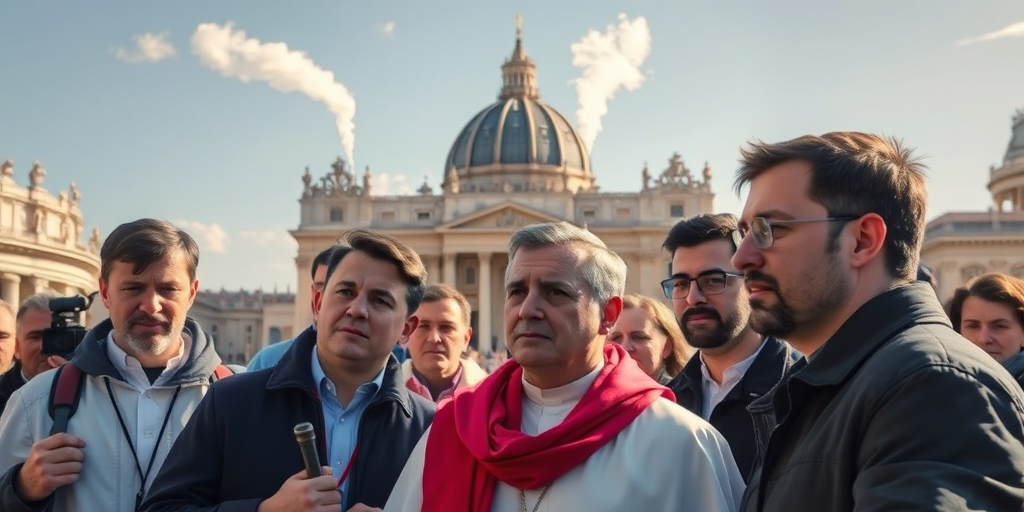Pope Leo XIV Faces Catholicism’s LGBTQ+ Crossroads: A Path Forward?
As Pope Leo XIV, the first American pontiff, steps into his significant role, the Catholic Church stands at a pivotal moment concerning LGBTQ+ inclusion. The election of Leo XIV, known for his advocacy for marginalized communities, offers a beacon of hope tempered by cautious apprehension in the hearts of LGBTQ+ Catholics. While his commitment to causes like migrant rights is reassuring, his affirmation of traditional family structures has fueled anxiety about the future recognition of queer families within the Church’s doctrine.
Background and Context: A Legacy of Bridge Building
Pope Francis’ tenure marked a transformative period for the Vatican’s relationship with the LGBTQ+ community. Known for his landmark statement, “Who am I to judge?” Francis initiated a dialogue that resounded across the globe, signaling a shift toward greater inclusivity. However, his papacy was not without controversy; actions such as issuing a document that denied the existence of transgender individuals contrasted with more affirmative gestures like sending supportive messages to LGBTQ+ Catholic organizations.
In this complex landscape, religious scholar Emma Cieslik sheds light on the enduring impact of such paradoxes. “Pope Francis’ attempts to include queer Catholics were crucial steps, albeit inconsistent,” she notes. “Now, the community looks to Pope Leo XIV with hopes for sustained dialogue and acknowledgment.”
Building Bridges: Local Hopes and Concerns
Father James Martin, a known advocate for LGBTQ+ Catholics, urges for continued bridge-building, a motif echoing from Francis’ term into Leo XIV’s potential legacy. “Pope Leo’s call to ‘build bridges’ signals an openness that many of us find promising,” Martin asserts, emphasizing that maintaining this connection is vital for a church that aspires to truly embrace all its followers.
In the Rio Grande Valley, a region deeply rooted in Catholicism, residents share mixed feelings of relief and skepticism following Leo XIV’s election. Local parishioner and advocate Rosa Hidalgo voices her cautious optimism: “We’ve seen steps toward acceptance, but real change has to come from authentic engagement with our stories and struggles.”
The Local Impact: Embracing Diversity in Faith
For many LGBTQ+ Catholics in South Texas, the path Pope Leo chooses will directly affect their spiritual and communal lives. As shown by recent forums and local gatherings, the conversation about inclusion remains a priority for faithful in the Valley. These discussions highlight not only the desire for acceptance but also the need for the Church to address practices like conversion therapy, which have historically harmed LGBTQ+ individuals.
The ripple effect of the Vatican’s stance can significantly influence regional Catholic communities where faith is interwoven with cultural identity. Parishioners hope that increased openness will empower queers to participate more fully in the religious and social life of the Church.
Charting the Future Course: Balancing Tradition and Progress
The Catholic Church, with its rich history and vast global influence, must navigate the intersection of time-honored traditions and progressive inclusion. Within the American context, the election of an American pope in itself marks a milestone, illustrating the possibility of fresh perspectives rooted in diverse experiences.
However, reconciling traditional teachings about family with the realities of the modern world presents ongoing challenges. As Pope Leo XIV deliberates his next steps, his actions will undeniably shape perceptions and participation among marginalized Catholic groups.
“Pope Leo’s journey is just beginning, and we hope it involves genuine engagement with the LGBTQ+ community,” Cieslik reflects. “There is room for growth, building upon Francis’s outreach efforts and truly embodying the Church’s mission of love and inclusivity.”
Engagement and Resources for Local Faith Communities
To facilitate understanding and foster ongoing dialogue, community organizations and parishes across Cameron County are expected to host discussions and workshops focusing on inclusivity within faith practices. Additionally, Father Martin’s outreach platform offers resources and support networks for LGBTQ+ Catholics seeking to navigate their spiritual journeys amid changing Church dynamics.
For residents and stakeholders, this pivotal moment under Pope Leo XIV could mean increased opportunities for active listening and collaborative faith practices—effects that will likely resonate far beyond the Valley.
As the Church awaits Pope Leo’s direction, the story unfolding is more than just the theological journey of a new pontiff. It is a reflection of the broader societal quest for inclusion, equity, and the dismantling of barriers that have long separated communities from their faith heritage. For Catholics worldwide, and particularly those in the Rio Grande Valley, Pope Leo XIV’s decisions may well chart the course for a more inclusive and affirming spiritual future.







